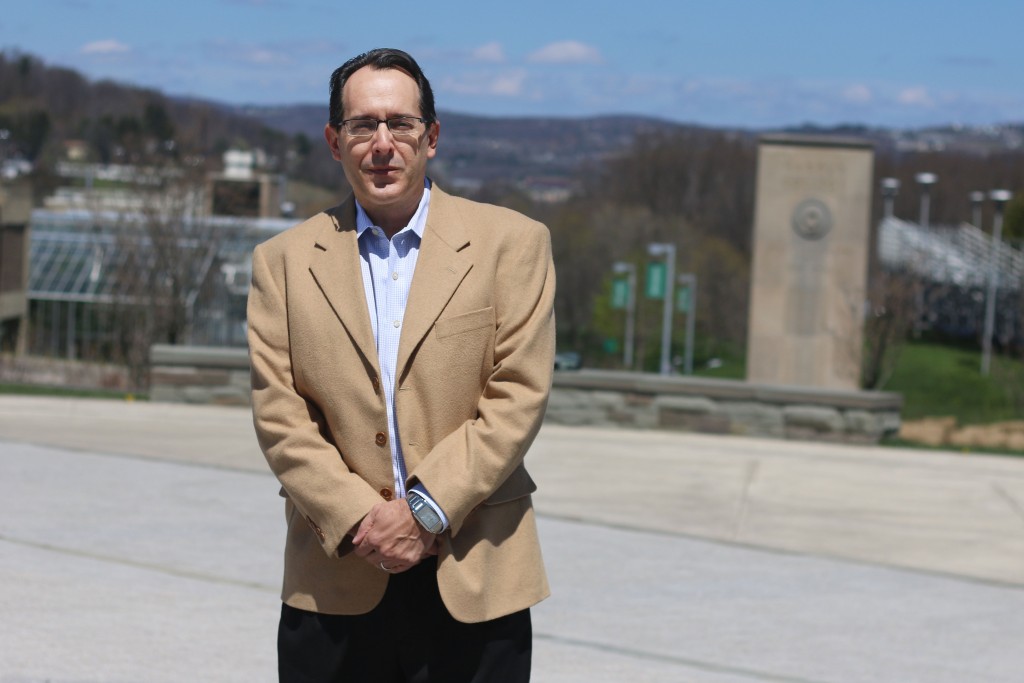
Binghamton University history professor Stephen Ortiz will deliver this year’s Last Lecture on the importance of embracing moments of uncertainty.
The Last Lecture series was inspired by Carnegie Mellon University professor Randy Pausch. After being diagnosed with pancreatic cancer, Pausch, a computer science professor, gave his final lecture, “Really Achieving Your Childhood Dreams” in September 2007 before dying the following year. Kicking off at BU with psychology professor Ann Merriwether in 2011, each year one professor has been tasked with giving a lecture as if it were their last.
Amanda Baker, the Student Association (SA) vice president for academic affairs and a senior majoring in history, organized this year’s lecture and asked Ortiz to be the keynote. According to Ortiz, the task originally seemed daunting and he credited Baker for giving him the will to participate.
“I first thought I was doing a history lecture,” Ortiz said. “But then Amanda said, ‘No, we want your deep thoughts.’ I’m terrified of deep thoughts and if someone else had asked me, I might not have agreed.”
Ortiz came to BU in 2010 after teaching at both Pennsylvania State University and Ohio State University. He grew up in Florida and received his bachelor’s from the University of Florida. Although BU is far from his hometown, Ortiz said he loves teaching at the University.
“I’m extraordinarily pleased to be here,” he said. “It’s a great place to be. There are so many interesting and successful people — students and professors — who make it a really fun job.”
Ortiz also earned a Ph.D. in history from the University of Florida, which he said was “in some ways an accident.” According to him, a lot of the experiences that shaped his life were originally unplanned, a trend that inspired his lecture titled, “The Accidental Historian.”
“The talk deals with my trajectory through my life, and how in many ways, there were many series of accidents that have gotten me here,” Ortiz said. “When you’re 22 and graduating from college, you get out there and have to make your own path. Sometimes accidents are fortuitous.”
For Ortiz, a lot of questions surrounded his plans post-graduation. And while this is not his actual last lecture, it may be the final one for many seniors. Ortiz said that in keeping with this idea, he will share questions that followed the conclusion of his personal college career.
“There were questions like, ‘Should I be a history major? Should I go to graduate school? Should I go back to graduate school?’” Ortiz said. “I wondered, ‘Am I able to write something that’s meaningful or has some impact?’”
Ortiz also said that sometimes, success only stems from understanding the importance of questions and not only focusing on answers.
“If you ask most people in [the Glenn G. Bartle Library] tower, even as accomplished as professors are on this campus, many of them will tell you there are times they feel like an imposter, that they don’t know enough,” Ortiz said. “And I think that’s an interesting phenomenon: the true kind of measure of whether you are an expert is realizing how much you really don’t know about something.”
Concluding with the notion that confusion can lead to progress, Ortiz credited the more chaotic moments in his life with shaping his identity.
“I wouldn’t be a good teacher and I maybe would be a less good person if I hadn’t had big gaps where I wasn’t doing what I do now,” Ortiz stated. “Those gaps don’t look like they have any bearing on who I am now, but are deeply central to my way of approaching the world. The unintended consequences of taking weird paths to your future can bring results that you can’t anticipate, but become central to who you are.”
Last Lecture will take place on May 3 at 7 p.m. in Old Union Hall and is open to all members of the campus community.


